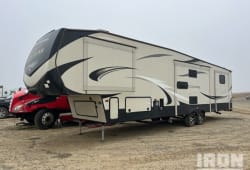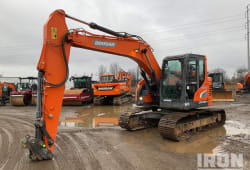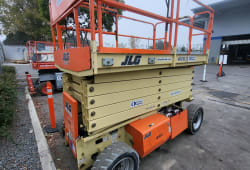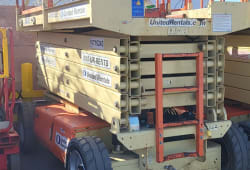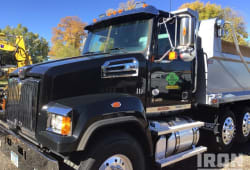Mastering Man Lifts: A Comprehensive Guide to Safe Operation and Efficient Use
10 Lectura mínima
)
marzo 24, 2024
Man lifts, also known as aerial lifts or cherry pickers, are essential pieces of equipment used across various industries for accessing elevated areas safely. These hydraulic platforms are mounted on vehicles or stationary structures, providing a stable platform for workers and equipment. They come in different types and configurations to suit different applications and environments, making them indispensable for tasks that require working at heights.
Types of Man Lifts
Scissor Lifts
Scissor lifts are characterized by their crisscrossing metal supports that extend vertically when activated. They offer a stable platform that can be raised or lowered, providing access to elevated areas. Scissor lifts are commonly used in indoor maintenance tasks, construction projects, and warehouse operations due to their stability and versatility.
Boom Lifts
Boom lifts, also referred to as cherry pickers, feature an extendable arm (or boom) with a platform or bucket at the end. The boom can be articulated or telescopic, allowing for precise positioning in tight spaces or over obstacles. Boom lifts are ideal for tasks that require reaching heights and angles that are inaccessible with other types of lifts.
Vertical Mast Lifts
Vertical mast lifts, sometimes called personnel lifts, consist of a single vertical mast with a platform at the top. They are compact and maneuverable, making them suitable for indoor use and tasks in confined spaces. Vertical mast lifts are commonly used for facility maintenance, inventory management, and stock picking in warehouses.
Articulating Lifts
Articulating lifts, also known as knuckle lifts, have multiple boom sections that articulate or bend, allowing for access to difficult-to-reach areas. The articulating mechanism provides flexibility and precision, making these lifts ideal for tasks that require precise positioning around obstacles or over irregular surfaces.
Uses of Man Lifts
:format(webp))
Man lifts serve various purposes across different industries:
Construction Projects:
Man lifts are indispensable for tasks such as installing fixtures, painting, and accessing high areas during construction. They provide a safe and efficient means of reaching elevated work areas, improving productivity, and reducing the risk of accidents.
Maintenance Work:
In facilities and commercial buildings, man lifts are used for routine maintenance tasks such as changing light bulbs, cleaning windows, and servicing HVAC systems. Their versatility and accessibility make them valuable assets for facility management teams.
Warehousing:
In warehouses and distribution centers, man lifts are used for inventory management, stock picking, and shelving operations. They enable workers to access goods stored at various heights quickly and safely, optimizing warehouse operations and maximizing storage capacity.
Painting and Decorating:
Artists and decorators use man lifts for mural painting, signage installation, and other creative projects that require working at heights. The stability and maneuverability of man lifts make them ideal for precise and detailed work, enhancing the quality and efficiency of artistic endeavors.
Safety Guidelines for Operating Man Lifts
Safety is paramount when operating man lifts to prevent accidents and injuries. Follow these guidelines to ensure safe operation:
Training and Certification:
Operators should undergo comprehensive training and obtain certification to operate man lifts safely. Training programs cover essential topics such as equipment operation, safety procedures, and emergency protocols.
Pre-Operation Inspection:
Before each use, inspect the man lift for any signs of damage, wear, or malfunction. Check the hydraulic system, electrical components, and structural integrity to ensure everything is in proper working condition.
Proper Use of Safety Equipment:
Wear appropriate personal protective equipment (PPE) such as harnesses, hard hats, and safety goggles when operating a man lift. Ensure that all safety equipment is properly fitted and in good condition to provide adequate protection.
Adhering to Weight Capacities:
Do not exceed the maximum weight capacity of the man lift, including the combined weight of workers, tools, and materials. Overloading the lift can compromise its stability and lead to accidents or equipment failure.
How to Choose the Right Man Lift
Choosing the right man lift depends on several factors:
Height Requirements: Determine the maximum height needed for your tasks, taking into account any obstacles or obstructions that may affect access.
Terrain and Surface Conditions: Consider whether the lift will be used indoors or outdoors, as well as the type of terrain or surface conditions it will encounter. Some lifts are better suited for rough or uneven terrain, while others are designed for use on smooth surfaces.
Indoor vs. Outdoor Use: Evaluate whether the lift will primarily be used indoors or outdoors, as this will influence factors such as size, maneuverability, and power source (electric vs. diesel).
Budget Considerations: Take into account the upfront cost of purchasing or renting a man lift, as well as ongoing maintenance expenses and operational costs. Compare different models and suppliers to find the best option that fits your budget and requirements.
Maintenance Tips for Man Lifts
Proper maintenance is essential for ensuring the longevity and performance of man lifts. Follow these tips to keep your equipment in optimal condition:
Regular Inspections:
Schedule routine inspections of the man lift to identify any signs of wear, damage, or malfunction. Check for leaks, loose bolts, worn-out components, and other issues that may affect safety or performance.
Lubrication:
Keep all moving parts well-lubricated to reduce friction and prevent premature wear. Use lubricants recommended by the manufacturer and follow the prescribed maintenance schedule for greasing bearings, joints, and hydraulic cylinders.
Battery Maintenance:
If your man lift is battery-powered, follow proper charging and maintenance procedures to prolong battery life and ensure reliable operation. Keep batteries clean, properly ventilated, and fully charged to avoid downtime and performance issues.
Professional Servicing:
Schedule regular servicing and maintenance by qualified technicians to address any issues and perform necessary repairs or adjustments. Professional servicing helps identify potential problems early and ensures compliance with safety standards and regulations.
Renting vs. Buying Man Lifts
Deciding whether to rent or buy a man lift depends on various factors:
Cost Comparison:
Compare the upfront cost of purchasing a man lift with the rental fees over time to determine the most cost-effective option for your budget and usage requirements.
Frequency of Use:
If you only need the man lift for occasional or short-term projects, renting may be more economical than buying, as it allows you to pay for equipment only when you need it.
Flexibility:
Renting provides flexibility to choose different types and sizes of man lifts based on specific project requirements without the long-term commitment or maintenance responsibilities associated with ownership.
Maintenance Responsibility:
When you rent a man lift, maintenance and servicing are typically included in the rental agreement, relieving you of the responsibility for upkeep and repairs. However, if you own a man lift, you are responsible for maintenance, servicing, and compliance with safety regulations.
Top Manufacturers of Man Lifts
Several reputable manufacturers produce high-quality man lifts:
Genie:
Genie is a leading manufacturer of aerial work platforms, known for their innovative designs, reliability, and performance. They offer a wide range of scissor lifts, boom lifts, and vertical mast lifts for various applications.
JLG:
JLG Industries is a global provider of access equipment, specializing in boom lifts, scissor lifts, and telehandlers. They are known for their robust construction, advanced technology, and extensive product lineup suitable for construction, maintenance, and industrial applications.
Skyjack:
Skyjack is recognized for producing rugged and reliable aerial work platforms with a focus on safety and simplicity of design. Their line of scissor lifts and vertical mast lifts is popular among contractors and rental companies for their ease of use and low maintenance requirements.
Haulotte:
Haulotte is a leading manufacturer of lifting equipment, offering a diverse range of scissor lifts, articulating booms, and telescopic booms. Their lifts are known for their durability, versatility, and innovative features, making them ideal for a wide range of applications in construction, maintenance, and industrial settings.
Case Studies: Successful Applications of Man Lifts
Construction Site Efficiency
A construction company faced the challenge of installing exterior cladding on a high-rise building. Traditional scaffolding was time-consuming to erect and dismantle, causing delays in the construction schedule. To streamline the process, the company opted to use boom lifts equipped with articulating booms. The lifts allowed workers to access the facade efficiently, reducing installation time by 30% compared to scaffolding. The project was completed on schedule, and the contractor received positive feedback for their innovative approach to construction site efficiency.
Facility Maintenance Solutions
A facility management company was tasked with maintaining the lighting system in a large warehouse with high ceilings. Traditional ladders were unsafe and impractical for reaching the overhead fixtures. To improve worker safety and efficiency, the company invested in scissor lifts equipped with extended platforms. The lifts provided stable and secure access to the lighting fixtures, allowing maintenance crews to complete the tasks quickly and safely. As a result, the facility experienced fewer maintenance-related accidents and downtime, leading to increased productivity and cost savings.
Future Trends in Man Lift Technology
As technology continues to advance, man lifts are evolving to meet the changing needs of industries:
Automation and Remote Operation:
Manufacturers are incorporating automation features and remote control capabilities into man lifts to enhance efficiency and safety. Automated systems allow for precise positioning and operation of the lift, reducing the risk of human error and improving productivity.
Enhanced Safety Features:
Newer models of man lifts are equipped with advanced safety systems such as collision avoidance sensors, automatic leveling, and overload protection. These features help prevent accidents and injuries by alerting operators to potential hazards and automatically adjusting lift settings to maintain stability and safety.
Eco-Friendly Designs:
There is a growing emphasis on developing electric and hybrid-powered man-lifts to reduce emissions and minimize environmental impact. Electric lifts produce zero emissions during operation, making them ideal for indoor use and environmentally sensitive areas. Hybrid models combine the benefits of electric power with the extended range and flexibility of diesel engines, offering a versatile solution for a wide range of applications.
Conclusion
Man lifts are indispensable tools for accessing elevated work areas safely and efficiently across various industries. Whether used for construction, maintenance, warehousing, or other applications, choosing the right man lift and following proper safety guidelines are essential for ensuring productivity and minimizing risks. By staying informed about the latest advancements in man-lift technology and adopting best practices for operation and maintenance, businesses can optimize their use of man-lifts and achieve greater success in their operations.
FAQs About Using Man Lifts
Are man lifts safe to use?
Yes, when operated correctly and following proper safety protocols, man lifts are safe to use. It's essential to provide adequate training to operators, conduct regular inspections, and adhere to weight capacities and safety guidelines to prevent accidents and injuries.
Can anyone operate a man lift?
No, only trained and certified individuals should operate man lifts. Proper training ensures that operators understand how to safely operate the equipment, identify potential hazards, and respond to emergencies effectively.
What are the main benefits of using man lifts?
Man lifts offer several benefits, including increased productivity, improved worker safety, and access to elevated areas that are difficult to reach using traditional methods such as ladders or scaffolding. They also provide greater flexibility and efficiency in completing tasks at height.
How do I know which type of man lift is best for my needs?
Choosing the right man lift depends on factors such as the height and type of work, terrain and surface conditions, indoor or outdoor use, and budget considerations. Consulting with a reputable equipment supplier or rental company can help you determine the most suitable option for your specific requirements.
Are there any regulations or standards governing the use of man lifts?
Yes, there are regulations and standards set forth by organizations such as OSHA (Occupational Safety and Health Administration) and ANSI (American National Standards Institute) that outline requirements for the safe operation of man lifts. It's essential to familiarize yourself with these regulations and ensure compliance to maintain a safe work environment.

